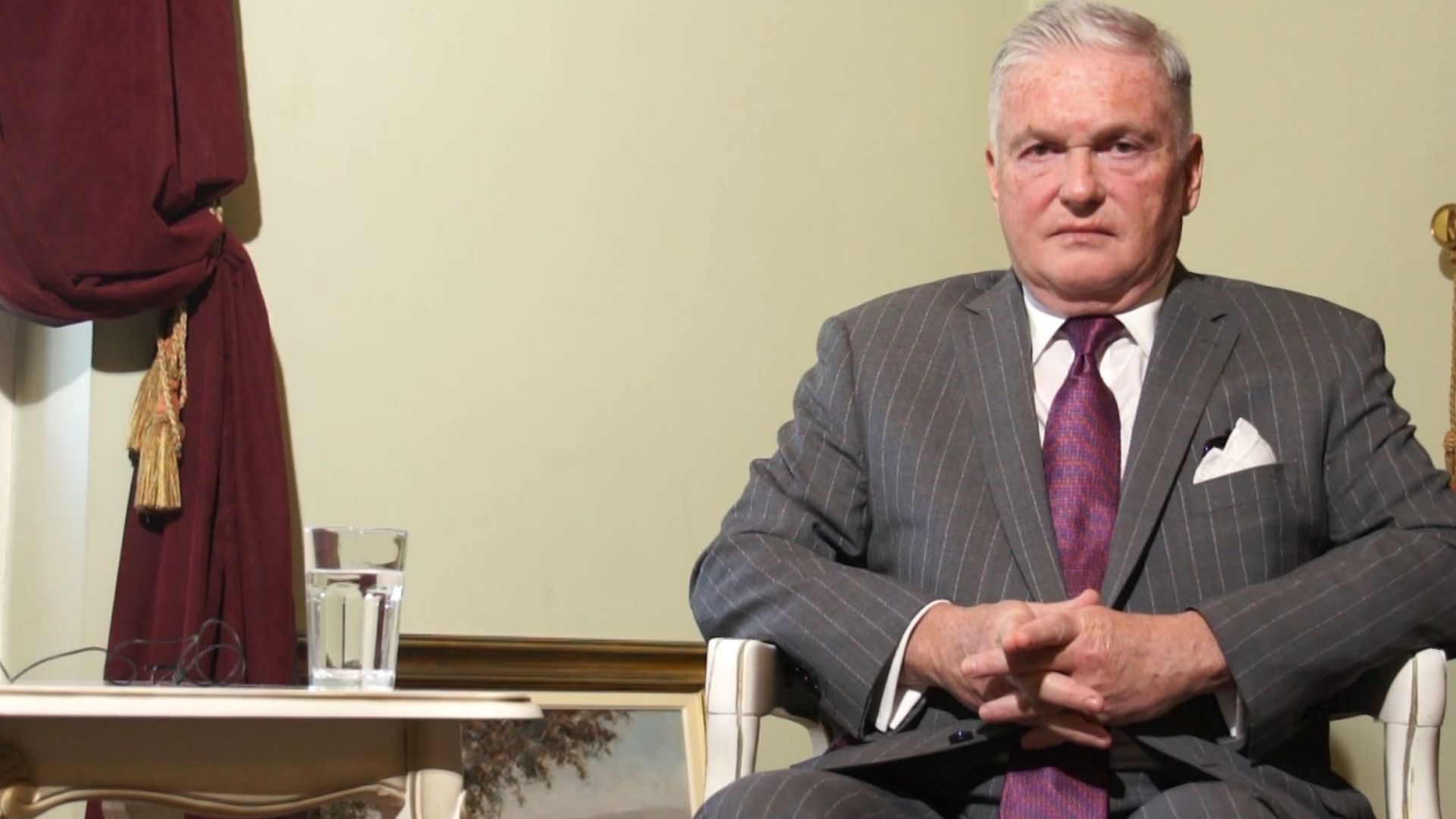balada unui om slab
pășești înăuntru
cu creionul în mînă
vezi un om dezbrăcat
și-ți zici, „cine-i bărbatul ăsta?”
oricît te-ai strădui
nu poți pricepe
oare ce vei putea spune
cînd vei ajunge acasă
pentru că se întîmplă ceva aici
însă nu reușești să pricepi ce anume
nu-i așa, domnule jones?
ridici capul
și întrebi, „aici e?”
cineva arată înspre tine și zice
„e al lui”
tu zici, „ce e al meu?”
altcineva zice, „unde e ce?”
iar tu zici, „doamne dumnezeule
sînt chiar singur aici?”
dar se întîmplă ceva aici
însă nu reușești să pricepi ce anume
nu-i așa, domnule jones?
arăți biletul
te așezi și privești spre mîncătorul de sticlă
care se și îndreaptă spre tine
de îndată ce te aude vorbind
și te întreabă, „cum te simți
sa fii așa un ciudat?”
răspunzi, „imposibil”
în timp ce el îți pune în palmă un oscior
pentru că se întîmplă ceva aici
însă nu reușești să pricepi ce anume
nu-i așa, domnule jones?
ai foarte multe cunoștințe
printre tăietorii de lemne
care îți furnizează fapte
pentru cazurile în care cineva îți atacă iluziile
însă nimeni nu mai are respect
de altfel, toți se așteaptă
doar să semnezi cîte un cec
către vreo organizație caritabilă
te-ai întîlnit cu profesori
și le-ai plăcut tuturor
ai discutat cu mari avocați
despre corupție și despre escrocherii
ai citit toate
cărțile lui f. scott fitzgerald
ești un om foarte citit
toată lumea știe asta
dar se întîmplă ceva aici
însă nu reușești să pricepi ce anume
nu-i așa, domnule jones?
ei, și cînd înghițitorul de săbii vine spre tine
îngenunchează
își face cruce
pocnește din tocurile înalte
și, fără vreo altă avertizare,
te întreabă cum te simți
apoi zice, „poftiți gîtul dvs înapoi,
mulțumesc pentru împrumut”
și știi că se întîmplă ceva aici
însă nu reușești să pricepi ce anume
nu-i așa, domnule jones?
apoi vezi cum piticul chior
strigă cuvîntul „acum”
și zici, „ce rost are?”
el zice, „cum?”
tu zici, „ce înseamnă asta?”
el îți urlă înapoi, „ești o vacă
dă-mi niște lapte
sau du-te acasă”
și știi că se întîmplă ceva aici
însă nu reușești să pricepi ce anume
nu-i așa, domnule jones?
ei, și pășești înăuntru
exact ca o camilă, te schimonosești
îți pui ochii într-un buzunar
îți așezi nasul pe podea
ar trebui sa apară o lege
împotriva acestor apariții ale tale
ar trebui să fi obligat
sa porți dopuri în urechi
pentru că se întîmplă ceva aici
însă nu reușești să pricepi ce anume
nu-i așa, domnule jones?





















35 Comments
Costin A.
24 May 2011Vezi mai multe video din muzica
Infidels (Columbia Records, 1983)
Neighborhood Bully
Well, the neighborhood bully, he’s just one man,
His enemies say he’s on their land.
They got him outnumbered about a million to one,
He got no place to escape to, no place to run.
He’s the neighborhood bully.
The neighborhood bully just lives to survive,
He’s criticized and condemned for being alive.
He’s not supposed to fight back, he’s supposed to have thick skin,
He’s supposed to lay down and die when his door is kicked in.
He’s the neighborhood bully.
He’s wandered the earth an exiled man.
Seen his family scattered, his people hounded and torn,
He’s always on trial for just being born.
He’s the neighborhood bully.
Old women condemned him, said he should apologize.
Then he destroyed a bomb factory, nobody was glad.
The bombs were meant for him.
He was supposed to feel bad.
He’s the neighborhood bully.
That he’ll live by the rules that the world makes for him,
‘Cause there’s a noose at his neck and a gun at his back
And a license to kill him is given out to every maniac.
He’s the neighborhood bully.
What he gets he must pay for, he don’t get it out of love.
He buys obsolete weapons and he won’t be denied
But no one sends flesh and blood to fight by his side.
He’s the neighborhood bully.
They pray for it nightly that the bloodshed must cease.
Now, they wouldn’t hurt a fly.
To hurt one they would weep.
They lay and they wait for this bully to fall asleep.
He’s the neighborhood bully.
Egypt and Rome, even the great Babylon.
He’s made a garden of paradise in the desert sand,
In bed with nobody, under no one’s command.
He’s the neighborhood bully.
No contract he signed was worth what it was written on.
He took the crumbs of the world and he turned it into wealth,
Took sickness and disease and he turned it into health.
He’s the neighborhood bully.
Nothin’, they say.
He just likes to cause war.
Pride and prejudice and superstition indeed,
They wait for this bully like a dog waits to feed.
He’s the neighborhood bully.
Does he change the course of rivers?
Does he pollute the moon and stars?
Neighborhood bully, standing on the hill,
Running out the clock, time standing still,
Neighborhood bully.
ramine actual.
http://inliniedreapta.net/bob-…..ood-bully/
emil b.
24 May 2011Liviu, multumiri pentru traducere. A fost odata…
Bob Dylan – „The Witmark Demos: 1962-1964” from Columbia Records on Vimeo.
Liv St Omer
24 May 2011Nu o scriu ca sa starnesc scandal, dar exista o parere destul de raspandita, in special printre cei din generatia lui emil, cum ca „muzica pop-rock e un curent care nu se indreapta nicaieri”, ca multe sunt „experimente ratate”, ca sunt „produse de masa a si/sau anti-culturale”, etc (vezi:
http://traianungureanu-tru.blo…..-over.html
). Ce parere aveti? Pentru ca, daca TRU+etc au dreptate, ar insemna ca ne pierdem timpul ascultand genul acesta de muzica (parerea mea cred ca se subintelege-NU au dreptate). Daca nu au dreptate, atunci nu consider inutil sa spunem asta, „nu au dreptate”, si sa aratam unde si cum gresesc.
Nu cred ca e chiar off-topic-cand a inceput, Dylan canta pop-rock, cele doua curente nu se despartisera inca-eu cel putin asa stiu.
Costin A.
24 May 2011Alexandru Andrieş despre Bob Dylan
Puteti asculta interviul aici
Alexandru Andries- Clipa mea
Ii ascult si pe Dylan si pe Andries, si ambii, la fel ca Tom Waits, sint inepuizabili, dar parca Andries ii intrece ????
Costin A.
24 May 2011Liv, TRU se refera in articolul de care pomenesti in primul rind la Michael Jackson, din cite am vazut, si nu la rock in general.
O parere similara cu ce spui tu avea Allan Bloom, autorul The Closing of the American Mind, in care dedica un capitol intreg muzicii rock:
http://ia600309.us.archive.org…..anMind.pdf
Am citit cartea acum mai multi ani, e extraordinara cel putin, dar partea cu muzica, daca m-a facut sa ii dau partial dreptate si sa imi clarific niste lucruri pe care le custeam mai mult intuitiv, nu m-a convins pe deplin, si probabil era si normal din moment ce am crescut (si) cu muzica rock. Oricum, un text foarte interesant.
si asta:
http://www.nationalreview.com/…..nley-kurtz
Silvapro
24 May 2011In liceu cind eram axata pe slagarele de la radio, am primit cadou o caseta imprimata – pe-o parte Bob Dylan si pe cealalta Leonard Cohen (Avalanche). Cunosteam f. putina muzica buna (Pink Floyd, Deep Purple si inca vreo 2 grupe), si cu toate ca Doors ma fascinase si subjugase de la primul sunet (nu exagerez), am avut o aversiune instantanee la Dylan si Elazar Hacohen (asa cum se semneaza L. Cohen in cintecul Famous Blue Raincoat). Mi-a luat aproape o jumatate de an pina sa ma indragostesc de acea caseta. Asa cum nu stiam care-mi displace mai tare, dupa aceea si pina in ziua de azi, oscilez intre cei doi – care-mi place mai mult, mai ca toti prietenii mei.
Nu stiu ce se intimpla astazi, dar multe din linkuri si cintece din ILD nu se deschid sau nu sint disponibile. Nu mi-a mers nici cu Neighbourhood Bully, nici aici mai sus si nici pe Youtube. Exista asa un cintec sau nu?
In schimb am gasit o parodie pe Neighbourhood Bully si You’ve got to serve somebody al unor credinciosi cu kippa:
M-a amuzat acolo de exemplu textul ca Obama cind s-a dus in vizita in Egypt a intrebat cine a construit piramide. I s-a raspuns ca evreii iar concluzia a fost ca reprezinta un Jewish Settlement…
Mai mult covers am gasit in loc de cintecele lui originale. In fine, aici este chiar Bob Dylan:
emil b.
24 May 2011Liv, nu am nimic impotriva muzicii pop-rock. Unele lucruri imi plac, altele nu, de altele m-am plictisit si in general nu mai tin pasul cu acest gen de ani buni. Dar in matricea asta sonora am crescut si nu ma pot desprinde complet; nici nu vreau. In timp mi-am extins aria de interese si catre alte genuri sau sub-genuri muzicale. Chestiile vechi sunt supuse re-evaluarii pe parcursul anilor.
Silvapro
24 May 2011Eu nu cunosc acest termen de pop-rock. Pop de obicei reprezenta ceva usor, simplist, cum ar veni Europop. Era si rock greu sau solid rock si pop progrsiv. Pe unele le numeam eu, si probabil ca si altii, rock progresiv. Nu intru in sub-divizii ca glitter-rock, heavy meatal, etc.
Eu il stiam pe Bob Dylan mai mult incadrat in folk music, si daca vreti, ii putem spune si folk rock.
Ce-mseamna muzica care „nu ajunge nicaieri”? Daca ajunge in inima cuiva, daca provoaca niste sentimente si senzatii bune, nu mai inseamna ca e o pierdere de timp. Dylan a innebunit o groaza de oameni. Si in ziua de astazi tineri si batrini se imbulzesc sa-l vada in concert.
Poate puteti sa-mi dati si alte exemple de pop-rock?
Eu zic ca muzica este sublima, este arta, este spirit. Nu sint pentru nimic in lume de acord Combinata cu dans e si mai forte dupa parerea mea. Este ceva ancestral, tribal, de radacina. Este ceva din insasi natura omului. Chiar daca nu ar fi inventat-o nimeni, ea ar fi existat in om. E viata, e pulsul inimii, e ciclurile din natura, etc.
Eu nu vad nici macar in hip-hop o foma inferioara de muzica. Bineinteles ca-mi plac texte poetice. Dar la hip-hop fac abstractie de texte, si ma las furata de melodie, de bas, de ritm. Exista simburele de hip-hop bun intr-o mare de hip-hop plictisitor si idiot. Muzica poate trai si fara text, poate fi independenta de folosirea cuvintelor. Nu mai departe de muzica clasica sau alte genuri instrumentale. Asa cum poezia poate sta de sine statatoare.
#5 – Cred ca e de prisos sa mentionez ca nu sint de acord cu articolul si cu concluziile la care ajunge. Muzica e esenta vietii si fara ea viata e fada. Daca exista d-zeu, nu poate fi ca nu vine direct din Rai!
Vlad M.
24 May 2011Silvapro
Muzica clasica nu presupune, de regula, text, iar orice comparatie intre ea si gunoaiele prezentului este mai mult decat fortata. Muzica moderna are text, iar textul este inseparabil de ea, dar este definita in primul rand prin ritm, de cele mai multe ori masinal. Daca ignoram textele, problema noastra, dar nu putem veni si spune ca se poate trai si fara ele. Ne-am fura caciula singura, asta fiind doar gandire de om care cauta sa-si linisteasca o constiinta perfect constienta ca asculta porcarii. ????
Vlad M.
24 May 2011Exemplu.
Putem sa ignoram textul, daca ne suna bine linia melodica*, dar sa nu ne mintim nici un moment ca muzica n-ar fi proasta.
* Exemplul de mai sus imi suna bine, atat melodia, cat si vocea fiind interesante, dar a le rupe de text, in incercarea de a vinde jegul asta ca altceva decat jeg… este o greseala.
Vlad M.
24 May 2011Si ca sa fie clar, recunosc ca ascult porcarii, dar ma tratez. ????
P.S. Am gasit ceva foarte interesant la Scruton, o sa pun pe site cat de repede posibil.
Liv St Omer
24 May 2011@9: te contrazic respectuos; dar atatea si atatea bucati pentru cor de Bach, si ma opresc la el ca sa nu spun ceva gresit, dar atatea opere de Rossini, Verdi, Mozart, etc, care fara text nu ar putea sa „existe”, unde le incadrezi pe toate astea, nu la muzica clasica?
Nu pot asculta „exemplul” tau din motive tehnice (ti-am povestit :d ), insa chiar asa sa fie, chiar toata muzica contemporana sa fie o „porcarie”, „gunoi”? Noi, eu, tu, spunem asta acum; dar cine suntem noi s-o spunem? Si despre Mozart, si despre Bach s-au facut asemenea afirmatii la vremea lor (observa ca nu ii compar cu nimeni in special, ca sa nu sune penibil). Eu cred ca timpul trebuie sa „hotarasca” lucrurile astea; pot eu sa stiu daca peste 20 de ani se va mai asculta muzica formatiei X, care acum e celebra? Poate da, poate nu. Si, inainte sa raspunzi, da, sunt de acord ca multe, prea multe din „creatiile” contemporane sunt niste gunoaie, asa cum erau si in anii ’70. Dar nu toate.
@8 dupa cate stiu eu, Elvis e incadrat la pop-rock, de exemplu. Dylan nu stiu, sigur ca apartine folk-ului, eu ma refeream insa la anii 63-64 cand s-a lansat si cand, din cate mai tin eu minte, incanu era clar incadrabil.
@5 cateva citate ca dovada ca TRU generalizeaza:
Eu ii ascult in continuare cu placere pe „dinozaurienii” EL&P, Yes si, mai ales, Genesis; asta-i tot ce pot sa spun. De acord ca „variantele speed&trash” sunt niste porcarii; recunosc insa ca, atunci cand sunt foarte foaaaarte somnolent si am de lucru, Metallica sau Anthrax de pe youtube imi prind bine. Iar curentul goth-punk a dat totusi, dincolo de exagerarile si prostiile evidente, o gama de formatii si de artisti dragi inimii mele; atat. Intre altele, nihilismul goth al unor The Cure mi se pare preferabil de departe aceluiasi gen de nihilism al unor curente post-comuniste/post-naziste de care se face vorbire mult pe acest site. Cine asculta Cure nu risca sa sparga vitrine la diverse conventii NATO, nu risca sa agite steaguri la manifestatii post-globalizare sau sa devina musulman-fundamentalist-„punator-de-bombe”. Eu unul am ascultat, cand eram mai tanar, si n-am devenit, cel putin.
Vlad M.
24 May 2011Am scris „in general”, Liviu, dar muzica noastra suna foarte rau, sa fim sinceri, iar calitatea ei nu se schimba daca o ascultam si ne identificam cu ea. Muzica devine tot mai proasta, temele ei sunt tot „decazute”, iar ritmurile ei tot mai mecanizate; societatea o urmeaza indeaproape. Cat despre nihilism, chiar nu vad unde e marea calitate a nihilismului goth, doar existenta gradelor raului nu anuleaza raul.
P.S. Ordo Rosarius Equilibrio – In my little black dress .
Ordo Rosarius Equilibrio
Sau, pentru ceva mai mainstream, Lovegame (Lady Gaga)
Liv St Omer
24 May 2011Nu are nicio o mare calitate, nihilismul goth, desigur; atata doar ca, la unele formatii, cel putin, nu ajunge sa impinga la sinucidere sau alte traznai din astea; asta-i poate singura calitate. Lasa-ma cu Lady Gaga, ca pe aia nici eu nu pot sa o suport.
Absolut de acord cu tine. Tot ce spun este ca exista si mici, iesite din comun, foarte greu de gasit, si de ascultat, la radiourile mainstream, exceptii. Sigur ca ele nu fac regula, agreed. Insa eu spun ca atunci cand spunem „toata muzica noua e proasta”, bagam si acele mici exceptii la gramada. Mie, nefiind nici pe departe de specialitate, in materie de muzica, mi-e foarte greu sa spun „muzica cutare e gunoi, muzica cutare e geniala, o opera de arta”; de aia prefer sa discut in termeni de „imi place, nu imi place”. Exista si aici grade si nuante; daca imi place un lucru, o muzica, etc, asta nu inseamna neaparat ca ma identific cu el.
Iarasi, cand spui „muzica noastra”, asta suna foarte vag, si ar trebui sa clarifici. Daca de muzica de la 90% din radiourile mainstream vorbesti, atunci absolut, sunt de acord cu tine. Dar sa nu bagam in „gramada” si restul de 10%, totusi, pentru ca ar fi nedrept.
Liviu Crăciun
24 May 2011din lipsa de timp, doar un contraargument micut, dar hotarit ????
I’d like to spend some time in Mozambique
The sunny sky is aqua blue
And all the couples dancing cheek to cheek
It’s very nice to stay a week or two
And fall in love just me and you.
There’s a lot of pretty girls in Mozambique
And plenty time for good romance
And everybody likes to stop and speak
To give the special one you seek a chance
Or maybe say hello with just a glance.
Lying next to her by the ocean
Reaching out and touching her hand
Whispering your secret emotion
Magic in a magical land.
And when it’s time for leaving Mozambique
To say goodbye to sand and sea
You turn around to take a final peek
And you see why it’s so unique to be
Among the lovely people living free
Upon the beach of sunny Mozambique.
Vlad M.
24 May 2011Cand zic muzica noastra, ma refer la muzica ultimelor decenii, cea cu care am „crescut”: de la Madonna si MJ la Metallica si Slayer, de la The Cure pana la Ordo Rosario Equilibrio si Lady Gaga sau toate coastele hip-hop-ului si rap-ului.
Metallica este una din formatiile mele preferate, Liv St. Omer, but that doesn’t make it great music. E, in mod cert, mai buna decat altele, dar nu-i de ajuns.
oliver
24 May 2011Daca la 18 ani ascultam heavy metal, de pilda Helloween, si nu-mi prea pasa de textele pieselor astazi, cand sunt aproape de 40 de ani consider majoritatea textelor formatiilor mele preferate de pe vremuri ba prea „ecologiste” ba prea „proletare” ba prea anticapitaliste, antiamericane etc. Dar continui sa ascult piesele preferate si, ascultandu le, pot sa imi imaginez ca sunt imnuri inchinate unor idealuri proprii. De exemplu ascultand EAGLE FLY FREE al trupei germane Helloween simt ceea ce simteam si acum 20 de ani ascultand piesa asta: ca este un imn inchinat libertatii.
People are in big confusion
They don’t like their constitutions
Everyday they draw conclusions
And they’re still prepared for war
Some can say what’s ineffective
Some make up themselves attractive
Build up things they call protective
Well your life seems quite bizarre
Bridge: in the sky a mighty eagle
doesn’t care ‘bout what’s illegal
on it’s wings the rainbow’s light
it’s flying to eternity
Chorus: eagle fly free
Let people see
just make it your own way
leave time behind
Follow the sign
together we’ll fly someday
Hey, we think so supersonic
And we make our bombs atomic
Or the better quite neutronic
But the poor don’t see a dime
Nowadays the air’s polluted
Ancient people persecuted
That’s what mankind contributed
To create a better time
Bridge: in the sky a mighty eagle
doesn’t care ‘bout what’s illegal
on it’s wings the rainbow’s light
it’s flying to eternity
Chorus: eagle fly free
let people see
just make it your own way
leave time behind
follow the sign
together we’ll fly someday
Liviu Crăciun
24 May 2011oliver
erau destui (si inca mai sint) si dintre cei refractari la amorul cu mama gaia, terorism anti-nuclear si alte shfortari anuale de redistribuire a saraciei; uite unii care n-au prea rezonat la noile religii ????
(poate ar fi cazul sa facem un mic serial)
My uncle has a country place
That no one knows about.
He says it used to be a farm,
Before the Motor Law.
And on Sundays I elude the Eyes,
And hop the Turbine Freight
To far outside the Wire,
Where my white-haired uncle waits.
Jump to the ground
As the Turbo slows to cross the Borderline.
Run like the wind,
As excitement shivers up and down my spine.
Down in his barn,
My uncle preserved for me an old machine,
For fifty-odd years.
To keep it as new has been his dearest dream.
I strip away the old debris
That hides a shining car.
A brilliant red Barchetta
From a better, vanished time.
I fire up the willing engine,
Responding with a roar.
Tires spitting gravel,
I commit my weekly crime…
Wind-
In my hair-
Shifting and drifting-
Mechanical music-
Adrenalin surge…
Well-weathered leather,
Hot metal and oil,
The scented country air.
Sunlight on chrome,
The blur of the landscape,
Every nerve aware.
Suddenly ahead of me,
Across the mountainside,
A gleaming alloy air-car
Shoots towards me, two lanes wide.
I spin around with shrieking tires,
To run the deadly race,
Go screaming through the valley
As another joins the chase.
Drive like the wind,
Straining the limits of machine and man.
Laughing out loud
With fear and hope, I’ve got a desperate plan.
At the one-lane bridge
I leave the giants stranded at the riverside.
Race back to the farm, to dream with my uncle at the fireside
Silvapro
24 May 2011Ordo Rosarius Equilibrio – suna bine si aminteste mult de Legendary Pink Dots, pe care i-am vazut intr-o sala simpatica si aproximativ intima, intr-un loc cult – muzeu de arta si arta etnica – Muzeul Eretz Israel (Muzeul Tarii Israel). Exista un oarecare trend ca muzeele sau institutiile culte sa mai sparga gheata si scortozitatea si sa gazduiasca si formatii de genul acesta. Chiar si Muzeul Tel-Aviv cel oficial a gazduit multe formatii ca de ex. Tuxedomoon, si chiar a dedicat seri cu David Bowie in clipuri, pe timpul cind era f. greu sa ai ocazia sa vizionezi clipuri. Pur si simplu n-aveai unde.
Asa cum filarmonici celebre coopereaza in concerte comune cu Deep Purple etc.
In urmatorul link inca un exemplu. Eu nu ma dau in vint dupa heavy metal, dar acest cintec merita si nici nu as fi ghicit din cintec ca Tankian face parte din acest curent::
(dar am auzit ca, din pacate, tipul e pro-palestinian).
Muzica proasta este o chestie de superficialitate a simtului. Muzica suie pentru suflete aride. Exista prea multe cintece care-mi produc reactia „pentru ce au facut cintecul asta?”, adica nu spune nimic. Or fi citeva dragute, dar in general disco nu-mi place, Gaga nu-mi place, majoritatea lui Michael Jackson nu-mi place, chiar nu ma omor nici dupa Diana Ross. Pe Lady Gaga nici n-am cunoscut-o pina la parodia cu bibliotecarii. Gaga e penibila.
Si eu ascult „dinozaurii” cu mare placere.
Continui sa sustin ca muzica moderna de orice fel poate f. bine sa se lipseasca de cuvinte, la fel ca muzica clasica. N-am spus ca nu exista muzica clasica vocala, cu text sau fara. Opera in general nu-mi place, multe din ele sint kitch si impopotanate. De multe ori narative patetice care creeaza reactii automate, destul de golase, ca si textul. Stiu ca voi supara pe multi cu aceste afirmatii, dar asta e parerea mea. Unele piese de hip-hop ating niste coarde si sensibilitati nu mai putin decit alte muzici socotite elevate, si in orice caz nu le gasesc mai prejos decit opera.
Red Hot Chili Peppers – Multe ale lor ma lasa rece, dar nu asta:
Dar sa nu-l uitam pe Bob Dylan – in el sintem uniti ????
Silvapro
24 May 2011* Vlad M.
Nu sint de acord cu asta. Totdeauna s-a crezut asa. Peste 30 de ani, tinerii de azi vor spune acelasi lucru copiilor lor.
Cind a aparut tangoul, batrinii erau scandalizati. Apoi pentru tinerii din urmatoarea generatie devenise invechit, de la naftalina, al babacilor (sint constienta ca de citiva ani buni se bucura de mare revival).
Cu ce e mai prost trip-hop? Exista piese extraordinare in acest gen. Totul e sa nu pierdem legatura cu ce se intimpla, altfel ni se vor parea ciudate. Eu mi-am promis in tinerete to follow si sa nu devin ca tata. Tata a ramas in urma inca de tinar, dar mama s-a adaptat f. usor si traia emotii mari cu Dylan, Leonard Cohen. Sa nu mai vorbim de Doors – era nebuna dupa muzica lor. Bowie si mai ales Jagger. Pe care i-a descoperit dupa virsta de 50 de ani prin mine. S.a.m.d.
* Am vrut sa pun Lay Lady Lay / Bob Dylan inca de ieri, dar pe Youtube nu a fost chip de toate cover versions si alte prostii, sau fara calitate sonora. Are cineva un link bun?
Silvapro
24 May 2011Nu am vrut sa spun ca v-ati rupt de muzica contemporana si ca nu sinteti actualizati la zi. Eu vorbeam de fapt de acea tendinta de a atasa valoare mai mare muzicii din trecut si de a desconsidera intr-o oarecare masura ce se creeaza astazi. Am si eu aceasta tendinta dar nu in domeniul muzicii ci despre raporturile dintre oameni, rabdare, atitudine, respect, legaturile de familie, etc.
Vlad M.
24 May 2011Liv St Omer
24 May 2011Vlad-lasa-i pe Ordo Rosarius, nu sunt un exempolu bun. Si Oliver, si Liviu Craciun ti-au dat aici 2 exemple de muzici contemporane, wich do not suck, care n-au avut treaba cu progresismul, nihilismul, etc (intre altele, Rush au si o piesa „big money”, un fel de oda marelui capital…..ce vrei mai mult??). Sigur ca sunt 1%, din valul urias de junk care ne inconjoara. Dar asta nu inseamna ca „muzica e din ce in ce mai proasta”, wrong, inseamna doar ca n-a avut nimeni cand sa faca o triere, ca mai trebuie sa asteptam cativa ani pentru asta (btw: da, de acord, Metallica sucks, mie nu imi plac deloc….then again, si Rush sunt tot heavy metal, stii!). Daca ai fi trait pe vremea lui Mozart, ai fi spus matematic exactacelasi lucru: muzica actuala e din ce in ce mai proasta, nu se mai canta ca pe vremuri, operele astea in alta limba decat cea italiana sunt de kk, eheeeeei, ce bine era pe vremea lui Bach! Desi, si pe vremea aia, muzica cu adevarat buna era cam 1% din tot ce aparea, iar Mozart facea parte din acest 1%. Iar „marea majoritate” era junk, intre timp a disparut in neant, insa pe vremea aia „marea majoritate” era la moda. Sa nu imi sari la jugulara, tot ce vreau sa apun e ca „toate-s vechi si noua-s toate”, asa ca „tu ramai la toate rece”
Vlad M.
24 May 2011Am raspuns la ceva concret, Ordo Rosarius Equilibrio.
Metallica does not suck, dar aici vorbim despre muzica in sensul inalt, nu in sensul de „daca imi place, e fenomenal” , „daca suna bine, e grozav”, „daca MJ vinde si se asculta, atunci face muzica buna”. Sau ma rog, eu vorbesc in acest sens, voi mai degraba preferati sa ganditi ca niste fani, adaugand la gandirea de fan putin relativism cultural („ai fi spus la fel si despre Mozart”). In aceasta privinta, nu vom cadea de acord. Ramaneti cu ce doriti, eu stiu ca pot ramane cu Metallica si fara sa ii pun langa Dvorak. ????
P.S. Facts don’t cease to exist numai pentru ca le ignoram. Lady Gaga e mainstream si se asculta. Rihanna e mainstream si se asculta. Katy Perry e mainstream si se asculta. Ordo Rosarius Equilibrio nu e mainstream. In schimb, toate-s jeguri, produse ale unei culturi ajunse intr-un punct mort. Mizerii, nemaivorbind de manelele gipsanilor si pansuerile „baietasilor” de cartier scuipate pe ritmuri saltarete.
emil b.
24 May 2011Mai bine deconectati-va cu muzica japoneza.
Boris – Naki Kyoku
Keiji Haino – Here (part 1 & 2)
Yonin Bayashi – Omatsuri
bugsy
24 May 2011Metallica is the ONE!
este in eroare cine compara Metallica cu Bach/Mozart/Beethoven. pot fi ascultate impreuna sau pe rand. sunt muzici bune, care vor ramane!
MJ, Madonna, Rhyanna,…., Justin Biber = recycle bin! nu ar fi fost nimic fara MTV!
@silvapro: excelenta alegerea cu RHCP. U make my day!
dar nu e singura de calitate. de ex:
nu stiu daca este „dinozaur”, dar Love & Respect pentru Johnny Cash: http://www.youtube.com/watch?v…..re=related
Silvapro
24 May 2011Vlad M.
Nu m-am referit la cuvintele din Ordo Rosarius Equilibrio. Jeg nejeg, si tu ai spus ca suna bine,
Bugsy,
Cunosc bine numai ce s-a mai dat pe la radio RHCP. Nu stiu de ce nu-mi place Californication. Mai erau inca vreo 2 care ma cam plictiseau. Dar intr-o zi la bufet la servici pusesera un disc de-al lor f. fain cu muzica pe care n-o auzisem.
Despre Madonna – Am cunuscut-o prin Like a vergion. Toata lumea in jurul meu era innebunita. Eu am detestat-o ani de zile, era pe primul loc la cintareata cea mai infernala pt. mine, de fapt era in concurenta cu Olivia Newton-John. Nu-mi placea nimic la ea, inclusiv vocea.
Pina cind a aparut un cintec pe care il ascultam seara de seara la servici in timp ce lucram. As fi dat orice sa-l am, sa stiu cine-l cinta. Si nu aveam cum afla, deci nici cum sa fac rost de el. Dupa vreo doi ani l-am auzit in masina dar si numele de Madonna. Am crezut ca n-am inteles si ca n-avea legatura una cu alta. Apoi inca o data acelasi lucru s-a intimplat si la urma s-a adeverit. Culmea e ca imi placea enorm si vocea. Era vorba de acest cintec:
Sint curioasa daca mi-ar fi placut la fel de mult deca il ascultam biased din capul locului stiind ca e al Madonnei. Sper ca da, pentru ca de multe ori mi-am revizuit pareri despre muzica. De obicei de la negativ spre pozitiv.
Nici Kruder & Dorfmeister nu s-au dat in laturi si au o cooperare impreuna cu Madonna::
http://www.youtube.com/watch?v=PTCcdNu7928
Si asta-mi place (tot asa, n-am stiut ca ea il cinta)::
As fi preferat sa gasesc clipurile fara imagine, pentru ca experienta mea de la inceput era abstracta, si bineiteles neasociata cu Madonna.
Insa sint de acord ca peste 95 % din ceea ce face este pentri trash bin.
Silvapro
24 May 2011* Inca una buna cu Metalica:
* Ca sa nu ziceti ca nu sint sensibila si la cuvinte in cintece, pe acest cintec l-am ascultat si analizat timp de o luna intreaga, de citeva ori pe saptamina impreuna cu o prietena:
Leonard Cohen – The Master Song:
Silvapro
24 May 2011Emil B.
Ce surpriza placuta cu muzicile japoneze!
P.S. – ne faci si noua embed la cintece (si la #19 si la ultimele)?
bugsy
24 May 2011Silvapro, uite o solista care este mult peste Madonna:
dr pepper
24 May 2011si ca tot a adus cineva aminte de genesis pe aici, una dintre preferatele mele:
dr pepper
24 May 2011???? daca a adus aminte bugsy de anastacia:
http://video.mail.ru/mail/hristina71/867/871.html
restul au sters video clipul.
Silvapro
24 May 2011Bugsy,
Gind la gind cu bucurie, si eu postasem acelai cintec al Anastaciei „Left outside alone” la itemul de 8 Martie! Si Dr. Pepper o place, si tot acolo adusese „Not that kind”. Deci pentru Bugsy (pentru ca Dr. Ppper deja il vazuse acolo) imi permit si eu sa dublez cintecul „Jesus Christ Superstar” interpretat de Anastacia:
http://www.youtube.com/watch?v…..r_embedded
Sint de acord ca Anastacia e mult peste Madonna. In orice caz, Madonna in afara de cele citeva putine cintece bune, in mare majoritate e trash.
Iata inca una unde isi etalazeza vocea in toata splendoarea ei:
http://www.youtube.com/watch?v…..re=related
Silvapro
24 May 2011Si pentru ca am tot amintit de citeva ori de Legendary Pink Dots, cu inclinatii spre progresiv si psychedelic:
BellaDonna:
http://www.youtube.com/watch?v…..re=related
I love you in your tragic beauty:
http://www.youtube.com/watch?v=gtdYnLadNaw
Citadel:
http://www.youtube.com/watch?v=L7lNYx4iCkU
Harvest Babies:
http://www.youtube.com/watch?v=wIs9cF_wMzg
Silvapro
24 May 2011Si acesta este de-a dreptul splendid. E f. potrivit si pentru un numar bun de modern dance:
Legendary Pink Dots – Rainbows too?
http://www.youtube.com/watch?v…..re=related